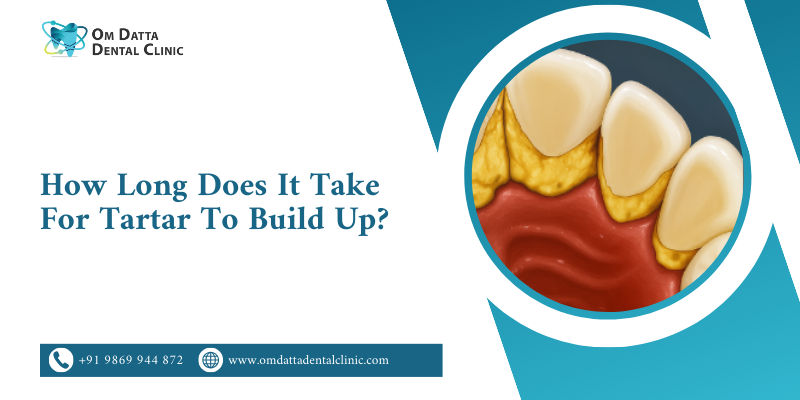
If you’ve ever seen how sugar syrup hardens into chikki during winters, you already have an idea of how plaque turns into tartar. At first, sugar syrup is soft and sticky, easy to stir and manage. But leave it for a while, and it hardens into a tough layer you can’t break without serious effort. Similarly, plaque, a soft, sticky film of bacteria, can quickly harden into tartar if not cleaned regularly. And once it does, it’s not something you can “brush away.” At Om Datta Dental Clinic, we’ve seen how regular teeth cleaning in Ghatkopar helps patients avoid this stubborn dental enemy.
But how fast does tartar form? Let’s break it down step-by-step so you can keep your smile healthy and tartar-free.
What is tartar, and how is it different from plaque?
This is one of the most common questions we get from patients. Many people think plaque and tartar are the same thing, but they’re different stages of the same problem.
Plaque is a soft, colorless or pale yellow sticky layer made up of food particles, bacteria, and saliva. It starts forming within hours of eating, especially after sugary or starchy meals.
Tartar (also called calculus) is what happens when plaque is left unremoved for too long. Minerals in your saliva react with the plaque, hardening it into a rough, yellow, or brown deposit on your teeth and along your gumline.
While plaque can be removed by daily brushing and flossing, tartar needs professional removal, ideally through teeth cleaning in Ghatkopar at a trusted clinic like ours.
How long does it take for tartar to form after cleaning?
You might be surprised to know that tartar doesn’t take months to appear — it can start forming in as little as 24 to 72 hours after plaque buildup. Here’s what happens:
- 0–4 Hours: Shortly after you finish a meal, the bacteria residing in your mouth spring into action, producing acids that begin to break down food particles. These acids combine with remnants of the meal and saliva, resulting in the formation of a sticky, transparent biofilm known as plaque.
- 12–24 Hours: As time passes, this initial layer of plaque thickens and becomes more structured. It adheres stubbornly to the surfaces of your teeth, creating a rough texture that can quickly become an environment for further bacterial growth.
- 24–72 Hours: Between one and three days after plaque formation, minerals present in your saliva start to crystallize within the plaque. This process hardens the plaque into tartar, also known as calculus, which firmly bonds to the teeth. Once tartar has formed, it can no longer be removed through regular brushing and requires professional dental cleaning.
This is why dentists recommend regular professional cleanings every 6 months. At Om Datta Dental Clinic, our gentle yet thorough approach to teeth cleaning in Ghatkopar ensures tartar is removed before it can harm your gums or cause bad breath.
Why is regular teeth cleaning important?
Regular teeth cleaning is not only for appearance but also essential for maintaining long-term dental health. It helps keep our oral health in good condition.
- Prevents Gum Disease: Tartar at the gumline irritates your gums, leading to inflammation, bleeding, and eventually periodontal disease.
- Keeps Breath Fresh: Bacteria trapped in tartar produce foul-smelling compounds.
- Avoids Stains: Tartar is porous and absorbs colors from tea, coffee, turmeric, and other Indian spices.
- Saves Money in the Long Run: Prevention is always cheaper than treatment. Regular teeth cleaning helps avoid costly dental work later.
Can tartar be removed at home or only by a dentist?
This is a question we hear almost daily. The answer is simple: once tartar forms, you can’t remove it at home, no matter how hard you brush.
Why? Tartar bonds strongly to your enamel and requires specialized tools to break and scrape it away without damaging the tooth surface. At Om Datta Dental Clinic, we use ultrasonic scalers and fine hand instruments for precise tartar removal.
While home remedies like baking soda or oil pulling may reduce surface stains, they cannot reach or remove tartar under the gumline. Attempting to scrape it yourself risks damaging your gums and enamel.
Factors affecting how fast tartar builds up
Not everyone’s tartar buildup rate is the same. It depends on:
- Diet: High sugar and starch diets fuel faster plaque growth.
- Oral Hygiene Habits: Skipping flossing or brushing less than twice a day speeds tartar formation.
- Saliva Composition: Some people naturally have more minerals in their saliva, leading to faster plaque formation.
- Smoking & Tobacco Use: Tobacco stains also accelerate tartar accumulation.
- Dental Crowding: Overlapping teeth can trap more plaque.
Keep Your Smile Tartar-Free!
Tartar waits for no one — and the best way to prevent it is regular professional care. Tartar buildup is a common but preventable dental issue. The key lies in understanding how quickly it forms and taking timely action. Just like you wouldn’t let chikki syrup harden if you wanted to mold it, you shouldn’t let plaque harden into tartar if you want healthy teeth. Regular brushing, flossing, and professional teeth cleaning in Ghatkopar at Om Datta Dental Clinic can help you stay ahead of tartar — and keep your smile radiant for years to come.
Frequently Asked Questions
- How often should I get professional cleaning?
For the majority of people, dental cleanings are recommended every six months. However, if you are susceptible to rapid tartar buildup, you may need to schedule these appointments more frequently to maintain optimal oral health. Regular check-ups help prevent plaque accumulation and ensure your teeth and gums remain in excellent condition. - Does tartar removal hurt?
No, with today’s advanced tools and gentle techniques, the experience is typically quite comfortable and often entirely painless. - Can children get tartar?
Absolutely! Children can indeed develop tartar buildup, particularly if they neglect their dental hygiene routine, such as skipping regular brushing sessions. Additionally, a diet rich in sugary treats like candies, cookies, and sweet beverages can significantly contribute to this issue. Over time, the combination of inadequate oral care and an excess of sugary snacks can lead to the hardening of plaque on their teeth, ultimately resulting in tartar formation. - Will scaling damage my enamel?
Professional teeth cleaning is completely safe when performed by skilled dental professionals who are specifically trained in oral hygiene practices. These experts utilize specialized techniques and equipment to ensure a thorough and effective cleaning of your teeth and gums, all while prioritizing your comfort and safety throughout the process. - Is tartar formation reversible?
Plaque, a soft and sticky film of bacteria that forms on your teeth, can be effectively reversed with proper dental hygiene and care. However, if left untreated, this plaque can harden into tartar, a rough and hardened deposit that firmly adheres to the teeth. Once tartar has formed, it cannot be removed through regular brushing or flossing and necessitates professional dental intervention for effective removal.
